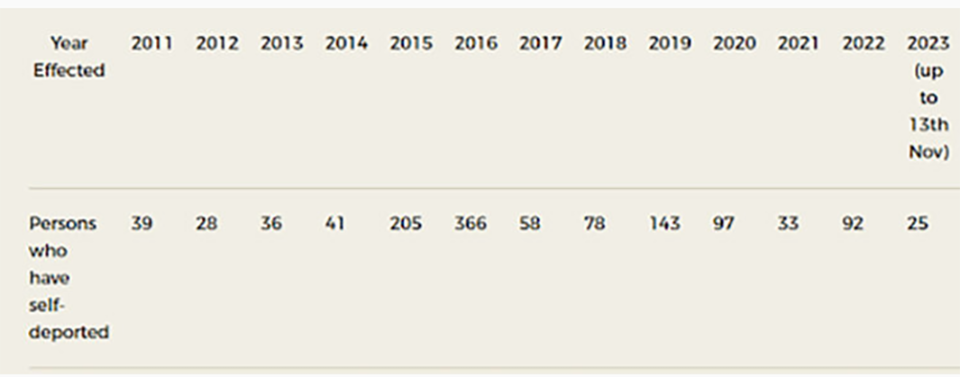Anyone following the discussion about the number of deportations from the Irish state will perhaps have formed a rather misleading impression of what is actually taking place.
It is being claimed that large numbers of deportation orders are issued – and also claimed that many people, happily, self-deport if they are not forcibly deported.
The data would suggest otherwise.
The statistics, which have been provided through a host of Parliamentary Questions, Freedom of Information requests, and statements by Ministers and others have been inconsistent. The one consistent trend, as Gript has reported several times on the basis of our own analysis of the aforementioned statistics, is that around 15% of deportation orders actually end in deportation.
According to figures from the Department of Justice the number of removals from the state in December was just 13 – hardly a sign that there has been huge new energy invested in tackling this issue as has been promised.

In May 2023, a PQ response to Aontú leader Peadar Tóibín from Minister Simon Harris stated that just 781 of 5,091 deportation orders were known to have resulted in the person who was issued with the order leaving the state.
That comes to 15.34% of the total of more than 5,000 deportation orders who were known to have left the country.
That is the largest sample we have from official sources, but other statistics have shown that the percentage leaving after a deportation order was as low as 11.5%.
When confronted with this reality, the state, NGOs and opposition parties which support the current system, have constantly referred to the numbers of persons who, they say, voluntarily leave – self-deporting from the State.
The impression is always given that this accounts for a large number of persons who when faced with deportation just decide to leave off their own bat.
We are expected to believe that some bizarre Code of Honour exists – one that is not extended to anyone else who has been proven to have broken the law, which persons issued with a deportation order effectively have. They have no legal entitlement to remain in the state after that order is issued.
And yet, the state and others have never been able to put a consistent figure on this.
On January 17, for example, Minister Helen McEntee informed Rural Independent TD for Laois/Offaly Carol Nolan that while no one knows, they were certain that the numbers involved were “significant.”

Well, we might cheekily suggest that they might be significantly low – something that was perhaps hinted at in the only actual official figure that the Minister provided.
This was in relation to Deputy Nolan’s query regarding the “number of persons, who having been issued with a notification of intention to deport, under Section 3 of the Immigration Act 1999 subsequently indicated their consent to a deportation order.”
Not many, it would appear from the answer provided at that time by Helen McEntee: a very low number of 45 in total over an 11 year period from 2013.
None, in fact, consented to a deportation order in some years, and just 12 of the 5,091 deportation orders issued in the five years covered by the statistics supplied to Peadar Tóibín. That amounts to less than one quarter of 1%.

The only other official figure we can refer to – beyond anecdotal accounts that “many individuals who are subject to Deportation Orders leave the state without notifying the relevant authorities” – are the actual numbers of people who are officially known to have “self-deported.”
That comes to a grand total of 1,241 in 13 years up to November 2023. Or, if we return to the statistics for 2018 – 2022, just 443 or 8.7%.
All of those figures confirm that the overall level of deportation orders that actually end in deportations are very small, and certainly close to the 15% we mentioned at the top.

And, of course, any contradictions in the official data in the numbers of self-deportations emanate from the source itself – the Department of Justice.
Claims to the contrary – and talking points which insist that self-deportations are happening in the majority of cases – are not backed by the evidence they have issued to date.